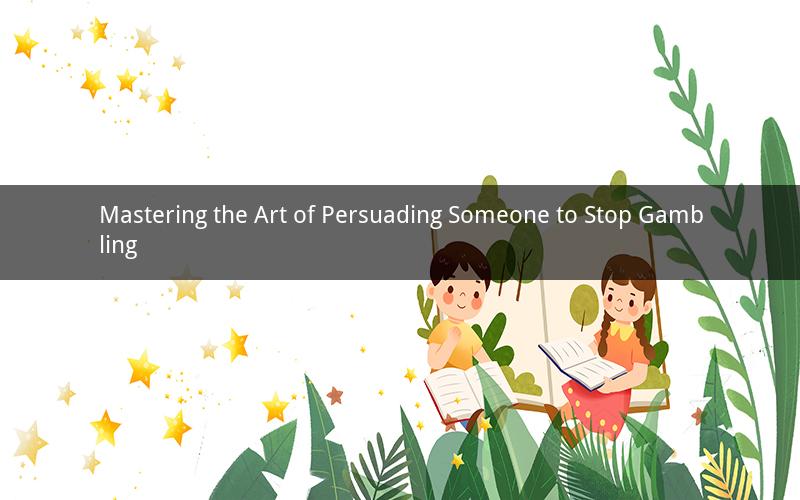
Introduction:
Gambling addiction is a serious issue that affects countless individuals and families worldwide. It can lead to financial, emotional, and psychological problems. If you know someone who is struggling with gambling addiction, it's crucial to understand how to persuade them to stop. In this article, we will discuss various strategies to help you effectively communicate with the person you care about and encourage them to seek help.
1. Educate Yourself about Gambling Addiction
Before you can persuade someone to stop gambling, it's essential to understand the nature of the addiction. Learn about the signs and symptoms of gambling addiction, the impact it has on the individual's life, and the available treatment options. This knowledge will enable you to approach the conversation with empathy and credibility.
2. Choose the Right Time and Place
Timing is everything when it comes to discussing sensitive topics like gambling addiction. Find a private and comfortable setting where both of you can talk openly without distractions. Choose a moment when the person is not under the influence of alcohol or drugs, as this could impair their judgment and make the conversation more challenging.
3. Use Empathy and Understanding
Empathy is key to persuading someone to stop gambling. Show genuine concern for the person's well-being and acknowledge the difficulties they are facing. Understand that they may be in denial or defensive, so approach the conversation with compassion rather than judgment.
4. Focus on the Consequences
People often continue gambling despite the negative consequences because they are in denial or don't fully grasp the extent of the problem. Help them realize the true impact of their addiction by discussing the consequences, such as financial ruin, damaged relationships, and mental health issues. Use specific examples to illustrate the consequences, and encourage them to share their own experiences.
5. Encourage Them to Seek Professional Help
Gambling addiction is a treatable condition, and seeking professional help is the most effective way to overcome it. Encourage your loved one to speak with a therapist, counselor, or support group. Provide them with information about local resources and treatment centers. Assure them that seeking help is a sign of strength, not weakness.
6. Offer Support and Encouragement
Supporting someone through their recovery journey is crucial. Let them know that you are there for them, no matter what. Offer to help them with practical tasks, such as accompanying them to therapy sessions or assisting with financial matters. Celebrate their successes and be patient during their setbacks.
7. Be Prepared for Resistance
It's not uncommon for individuals with gambling addiction to resist or become defensive when confronted about their problem. Prepare yourself for potential pushback and be patient. Avoid confrontational language and try to understand their perspective. Reiterate your concern for their well-being and emphasize that you are there to help them.
8. Set Boundaries and Consequences
Establish clear boundaries regarding gambling behavior and the associated consequences. For instance, you may need to limit your interaction with the person when they are under the influence of gambling or remove access to gambling websites and credit cards. Make sure the consequences are fair and enforceable.
9. Stay Informed and Engaged
Keep yourself informed about the latest research on gambling addiction and recovery strategies. Attend support groups or workshops to enhance your knowledge and skills. Staying engaged in the process will demonstrate your commitment to helping your loved one overcome their addiction.
10. Maintain Hope and Encouragement
Recovery from gambling addiction is a challenging process, and it's essential to maintain hope and encouragement throughout. Celebrate small victories and remind the person that they are not alone in their journey. Let them know that with determination, support, and professional help, they can overcome their addiction.
Questions and Answers:
1. Q: How can I convince someone who is in denial about their gambling addiction to seek help?
A: Approach the conversation with empathy and understanding. Focus on the consequences of their addiction and provide examples of how it is affecting their life. Offer support and encourage them to speak with a therapist or counselor.
2. Q: What if the person I'm trying to persuade to stop gambling becomes defensive or angry?
A: Stay calm and composed. Avoid confrontational language and try to understand their perspective. Reiterate your concern for their well-being and emphasize that you are there to help them.
3. Q: Can I force someone to stop gambling against their will?
A: No, you cannot force someone to stop gambling against their will. However, you can provide support, offer resources, and encourage them to seek help. It's essential to respect their autonomy and allow them to make their own decisions.
4. Q: How long does it take for someone to recover from gambling addiction?
A: The duration of recovery varies for each individual. Some may experience immediate improvement, while others may require ongoing treatment and support. It's essential to be patient and supportive throughout the process.
5. Q: Can family therapy help in overcoming gambling addiction?
A: Yes, family therapy can be highly beneficial in overcoming gambling addiction. It helps family members understand the addiction, improve communication, and develop coping strategies. Family therapy can also provide a supportive environment for the individual struggling with addiction.